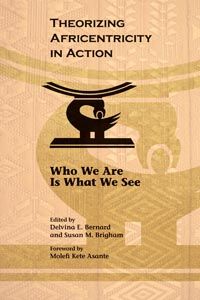Theorizing Africentricity in Action: Who We Are Is What We See
Delvina E. Bernard and Susan M. Brigham, editors
Fernwood Publishing, 2012, 128 p.
In the early 1990’s, a group of prominent African-Canadian educators formed the Black Learners Advisory Committee (BLAC) to examine the state of African Nova Scotian education. After two centuries of racist provincial education policies, Black students were dropping out of school and being suspended in disproportionately high numbers, and a series of brawls at Cole Harbour High School had exposed racial tension bubbling just below the surface.
In 1994 the committee released the influential BLAC Report on Education. It made 46 recommendations to improve the school experience for Black learners: develop courses in African-Canadian history and culture; encourage the hiring of more Black teachers; make schools more welcoming for Black parents and students; and more.
Out of the BLAC report was also born the Africentric Learning Institute, and from it comes this volume, a collection of essays written by graduate students in a program on Africentric Leadership in Education at Mount Saint Vincent University. Editors Delvina Bernard (Executive Director of the Council on African Canadian Education) and Susan Brigham (Associate Professor of Education at Mount Saint Vincent University) compile works on themes from Black feminism to African spirituality, all organized around the core principle of Africentricity - that is, the centring of African philosophy and history in the educational experience.
This is an academic book, and lay readers may occasionally get lost in the edu-speak. Fortunately, however, the essays are refreshingly honest and personal, dealing with a broad range of Black experience in Nova Scotia. Jay Jarvis’s opening “Letter to Nan” is an emotional reflection on how far African-centred learning has come in just a few generations, and how the author’s grandmother was ahead of her time in terms of her African-centred philosophy. In a spirited essay arguing the need for African-centred education, Malik Adams offers some startling statistics from one Halifax-area high school, saying that Black students make up 70 per cent of suspensions despite making up only 15 per cent of the school population. (Though he does note he reached this conclusion using “informal data.”) Tracey Thomas examines the complex dynamics of parental involvement in education, highlighting the “feeling of helplessness and intimidation” so often felt by Black parents when communicating with their children’s schools, which, ironically, was less often the case in the days of segregation.
At the time of the BLAC report, many in this province probably would not have imagined a full volume of graduate-level academic papers written by African Nova Scotian authors, on the topic of Africentric education to boot. The book does go into some of the serious problems still facing Black learners in Nova Scotia today, but still its voice is one of hope and pride. Teachers (like me) and others can learn a lot from it about our African Nova Scotian students and their families.
Ben Sichel teaches at Prince Andrew High School in Dartmouth.




